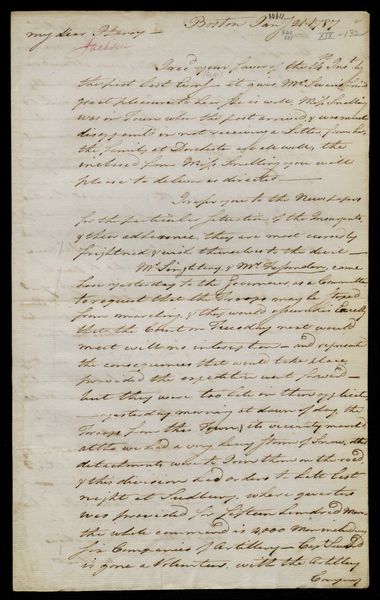Jackson, Henry, 1747-1809 to Henry Knox
Order a pdf of this item here.
A high-resolution version of this object is available for registered users. LOG IN
Gilder Lehrman Collection #: GLC02437.03420 Author/Creator: Jackson, Henry, 1747-1809 Place Written: Boston, Massachusetts Type: Autograph letter signed Date: January 21, 1787 Pagination: 4 p. : docket ; Height: 33.1 cm, Width: 20.3 cm Order a Copy
Writes that the insurgents are "most cursedly frightened, & wish themselves to the devil." Some of the insurgents went to see the Governor to ask that the troops not be deployed to stop the upcoming siege on the General Court; they promised the insurgents would not stop the court from sitting. They were too late, however, and the troops set off to march as planned. Provides some detail about where they were quartered and where they traveled. Explains that the troops are to track down the leaders of the insurgents if they do not stand and fight. Declares that it "is more like the year 75 than any thing I have seen since." Sends the compliments of General [Benjamin] Lincoln, who has set off with a "very respectable" command. Says he is very distressed by Knox's statement that Jackson and his officers should not become involved in the fight against the insurgents without orders from Knox or Congress. Several of his officers have already joined Lincoln's expedition and it is too late to recall them, but he suspects there will not be any actual fighting. Docketing notes that letter is a copy.
Citation Guidelines for Online Resources
The copyright law of the United States (title 17, United States Code) governs the making of photocopies or other reproductions of copyrighted material. Under certain conditions specified in the law, libraries and archives are authorized to furnish a photocopy or other reproduction. One of these specific conditions is that the photocopy or reproduction is not to be “used for any purpose other than private study, scholarship, or research.” If a user makes a request for, or later uses, a photocopy or reproduction for purposes in excess of “fair use,” that user may be liable for copyright infringement. This institution reserves the right to refuse to accept a copying order if, in its judgment, fulfillment of the order would involve violation of copyright law.
